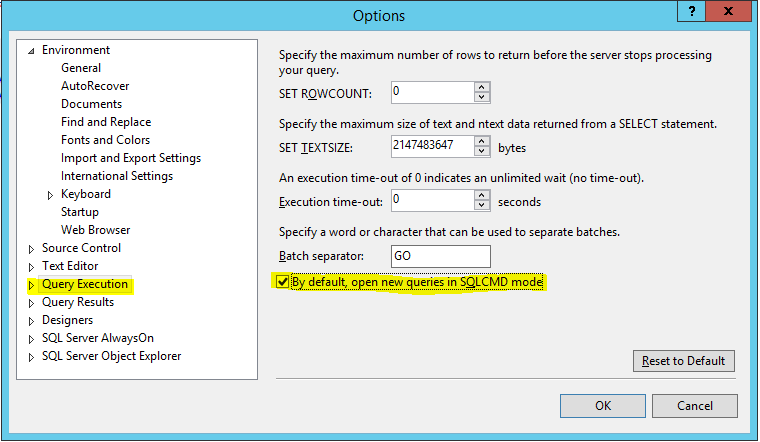SQL CMD tokens are replaced with their literal values prior TSQL parsing, so they can be used in places where a @ variable wouldn’t be permitted. Typically used for running queries within the SQL Server Management Studio, but such queries can be processed externally by calling SQLCMD.EXE (C:\Program Files\Microsoft SQL Server\Client SDK\ODBC\110\Tools\Binn\SQLCMD.EXE). The literals are not scoped by GO statements like an @ variable and they can be re-defined later in the TSQL
Enable SQL CMD processing from the SQL Server Management Studio
Example SQL
Transact-SQL
|
1 2 3 4 5 6 7 |
:setvar DB "ADatabase" :setvar NUMBER "10" select top $(NUMBER) * from [$(DB)].sys.tables order by name go :setvar DB "AnotherDatabase" select top $(NUMBER) * from [$(DB)].sys.tables order by name |
Example C# – Using SQLCMD.EXE to run scripts
C#
|
1 2 3 4 5 6 7 8 9 10 11 12 13 14 15 16 17 18 19 20 21 22 23 24 25 26 27 28 29 30 31 32 33 34 35 36 37 38 39 40 41 42 43 44 45 46 47 48 49 50 51 52 53 54 55 56 57 58 59 60 61 62 63 64 65 66 67 68 69 70 71 72 73 74 75 76 77 78 79 80 81 82 83 84 85 86 87 88 89 90 91 92 93 94 95 96 97 98 99 100 101 102 103 |
private bool processExited = true; private StringBuilder sqlCmdStdError = null; private StringBuilder sqlCmdStdOutput = null; private void ExecuteScriptFileViaSqlCmdUtility(string connectionString, string scriptPath, string outputPath) { const string exe = "sqlcmd.exe"; //C:\Program Files\Microsoft SQL Server\Client SDK\ODBC\110\Tools\Binn\SQLCMD.EXE try { // open the sql script file SqlConnectionStringBuilder ssb = new SqlConnectionStringBuilder(connectionString); System.Diagnostics.Debug.Write(string.Format("\t\t\tConnection = '{0}.{1}'", ssb.DataSource, ssb.InitialCatalog)); string arguments = String.Format("-b {0} {1} -S {2} -d {3} -I -r1 -i \"{4}\"", //-o \"{5}\" !string.IsNullOrEmpty(ssb.UserID) ? "-U " + ssb.UserID : null, !string.IsNullOrEmpty(ssb.Password) ? "-P " + ssb.Password : null, ssb.DataSource, ssb.InitialCatalog, scriptPath, outputPath); using (Process proc = new Process()) { string sqlout = string.Empty; proc.StartInfo.FileName = exe; proc.StartInfo.Arguments = arguments; proc.StartInfo.UseShellExecute = false; proc.StartInfo.RedirectStandardOutput = true; proc.StartInfo.RedirectStandardError = true; proc.StartInfo.CreateNoWindow = true; proc.Exited += new EventHandler(ProcessExited); proc.EnableRaisingEvents = true; processExited = false; proc.OutputDataReceived += (sender, args) => WriteStdOutput(args.Data); proc.ErrorDataReceived += (sender, args) => WriteStdError(args.Data); proc.Start(); proc.BeginOutputReadLine(); proc.BeginErrorReadLine(); // Synchronously read the standard output of the spawned process. if (!proc.WaitForExit(2000)) { while (true) { if (proc == null || proc.WaitForExit(100) || processExited) break; } } bool hasExited = proc.HasExited; int code = proc.ExitCode; proc.Close(); if (sqlCmdStdOutput != null) { string results = sqlCmdStdError.ToString(); if (!string.IsNullOrEmpty(results)) { System.Diagnostics.Debug.Write("\r\n\r\n\r\n[BEGIN SQL OUTPUT RESULT = '{0}']\r\n\r\n\r\n"); System.Diagnostics.Debug.Write(string.Format(results)); System.Diagnostics.Debug.Write("\r\n\r\n\r\n[END SQL OUTPUT RESULT = '{0}']\r\n\r\n\r\n"); } } if (sqlCmdStdError != null) { string errors = sqlCmdStdError.ToString(); if (!string.IsNullOrEmpty(errors)) { if (Regex.IsMatch(errors, "Msg .*, Level .*, State .*, Server .*") || errors.IndexOf("Error") >= 0 || errors.IndexOf("Invalid") >= 0) { System.Diagnostics.Debug.Write("\r\n\r\n\r\n[BEGIN SQL ERROR RESULT = '{0}']\r\n\r\n\r\n"); System.Diagnostics.Debug.Write(string.Format(errors)); System.Diagnostics.Debug.Write("\r\n\r\n\r\n[END SQL ERROR RESULT = '{0}']\r\n\r\n\r\n"); throw new Exception(errors); } } } } } catch (Exception ex) { throw new Exception(string.Format("Execute script file (via SqlCmd) failed @ '{0}'.\n\nError = {1}.\n\n", scriptPath, ex.Message), ex); } } void WriteStdError(string content) { if (sqlCmdStdError == null) sqlCmdStdError = new StringBuilder(); sqlCmdStdError.Append(content); } void WriteStdOutput(string content) { if (sqlCmdStdOutput == null) sqlCmdStdOutput = new StringBuilder(); sqlCmdStdOutput.Append(content); } private void ProcessExited(Object source, EventArgs e) { processExited = true; } |

